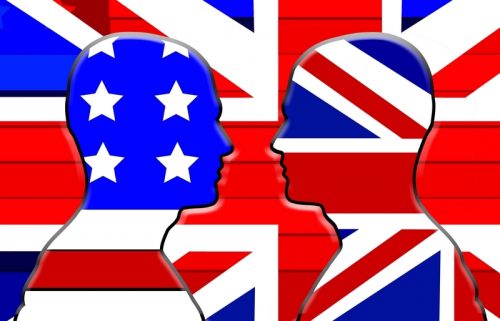(单词翻译:单击)
听力文本
Now the VOA Learning English program Words and Their Stories!
The fourth of July is Independence Day in the United States. On that day, we celebrate the decision by early American leaders to declare independence from Britain.
While people in both England and the U.S. speak English, the two types of English can be very different.
First, there are differences in spelling. The British like the letter "u" and have kept it in many words. Americans have dropped it. Somewhere in our language history, we decided that "labor," "color" and "favorite" were just fine without the "u" next to the "o."

But our differences go beyond spelling. Sometimes, we use different words entirely.
Here, we live in apartments with elevators. Over there, they live in flats with lifts.
We put diapers on our babies and push them in strollers. The British love their babies just as much as we do, but they use nappies and prams instead.
We power our cars with gas. They use petrol.
And, if we need to look in our car's dark trunk for something, we use a flashlight. They would use a torch to search their dark boot.
Then there are idioms. Some British and American idioms have the same meaning, but use different words. For example, in the U.S. if you want to add your opinion to a conversation, you put in your two cents. In the U.K., they put in their tuppence (or two pence) worth. Makes sense. They have pence and we don't.
Another example is the idiom about discussing the same issue again and again, especially if it cannot be resolved.
We say, "Don't beat a dead horse!" The British, on the other hand, advise against flogging one. And, if you are keeping secrets in the United States, you have skeletons in the closet. In Great Britain, your skeletons would be hiding in a cupboard.
But the real fun begins when we start exploring idioms and expressions that are unique to each country.
Let's start with "Bob's your uncle." To an American ear, that is a weird expression. And it has nothing to do with any relative you may or may not have named Bob. It is just a way to finish a set of simple instructions.
What is the equivalent -- the different but equal saying -- in the U.S.? Americans might say, "and there you have it!" Or sometimes, more dramatic people will say, "Ta-da!"
For example, imagine you are explaining to someone how to use your new fancy, coffee maker.
You explain: "First, you grind the beans. Then you put them in the side container and pour water in the main container. Push the button and ten minutes later -- ta-da! -- you have a pot of coffee!
Sometimes over a fresh pot of coffee, you may want to have a long talk with a friend. You might even throw in a little gossip. We call that a chat, or if it's a short conversation, chit-chat. The British would call it a "chin-wag."
If a British person says, "I've got the hump," we might think they are sick and need to see a doctor. But in fact, when Brits say they have a hump, it means they are mildly annoyed or upset. In the U.S., some informal ways to say we are upset are "I'm ticked off" or "I'm miffed."
Now, when Americans are really surprised by something, we can say we "are at a loss for words." Or more informally, we simply say we are "shocked" or "blown away."
Across the Atlantic in the U.K., they are "gobsmacked." In the U.S., we don't get smacked by gobs. Ever.
Finally, a familiar word used by both countries but in different ways is "cheers." We use the word over drinks when we are wishing someone good health or congratulating an accomplishment. The British use "cheers" to mean "thank you." For that, we Americans say, "Thank you!"
Now, we don't expect you to pick sides. Both American and British English have their strong points. But thanks for listening to Words and Their Stories, a program that teaches American English.
I'm Anna Matteo.
Cheers! I mean, thanks.
重点解析
1.go beyond 超出;超载
With self-confidence, I can go beyond myself.
有了自信,我可以超越自我。
2.put in two cents 发表个人意见,发言
Well, let's give him a chance to put in his two cents worth.
好吧,我们给他一个机会,让他发表意见吧。
3.pick side 选择阵营
That does not mean that we need to pick sides in an Iranian election or claim to know its result.
当然,这也并不是说我们非得在伊朗大选中选择一方阵营,或者声称我们已经知道了最终人选。
参考译文
VOA学英语《词汇掌故》节目!
7月4日是美国独立日。那天,我们庆祝,庆祝美国早期领导人宣告美利坚合众国脱离英国而独立。
虽然英国和美国都说英语,但这两种类型的英语可能会有很多差异。
首先,拼写上不同。英式英语喜欢用字母“u”,并让它出现在许多单词中。美国人已经弃用了。在我们的语言史上,我们觉得“labor(劳动)”、“color(颜色)”和“favorite(最喜欢的)”这些单词的“o”旁边没有“u”也挺好的。
但美式英语和英式英语的不同不止于拼写方面。有时,我们用的词完全不同。
在美国,我们住在带“elevator(电梯)”的“apartment(公寓)”。在英国,他们住在带“lift(电梯)”的“flat(公寓)”。
我们给宝宝穿上“diaper(纸尿裤)”,并将其放进“stroller(婴儿车)”。英国人也和我们一样爱他们的宝宝,但他们却使用“nappy(纸尿裤)”和“pram(婴儿车)”。
我们把汽油就做“gas”,他们用“pertol”。
而且,如果我们想在漆黑的汽车“trunk(后备箱)”里找点东西,我们会使用“flashlight(手电筒)”。他们会用“torch(手电筒)”在“boot(后备箱)”里找。
再有就是习语方面不同。一些英国习语和美国习语意思一样,但用词不同。例如,在美国,你想在对话中提出意见,称之为“put in your two cents”。在英国,则是“put in their tuppence (or two pence)”。有道理,因为他们有便士(pence),我们有美分(cent)。
另一个例子的习语是关于一遍又一遍地讨论同一个问题,特别是解决不了的问题。
当我们想表达“别再做无用之功”,会说“Don't beat a dead horse!”,而英国会将“beat(打)”换成“flog(鞭打)”。还有在表达“你在保守秘密”时,美国人会说“you have skeletons in the closet”,而英国人会将“closet(壁橱)”换成“cupboard(橱柜)”。
但当我们开始探索美国和英国各自特有的习语和表达时,真正的乐趣才刚刚开始。
让我们从英式英语的“Bob's your uncle(这就行了)”开始。对美国人来说,那是一个很奇怪的表达。这个表达和你也许有也许没有的亲戚鲍勃没有半点关系,这只是完成一套简单操作的一种方法。
美语里怎么表达呢?——相同意思不同说法的表达是什么呢?或许美国人会说“and there you have it(这就行了)”。或者有时候更有戏剧细胞的人会说,“Ta-da!(这就行了)”
举个例子,假设你在和一个人解释怎么使用你的新式咖啡壶。
你解释道:“首先,你把咖啡豆磨碎。然后你把它们放在旁边的容器里,把水倒在主容器里。按下按钮,十分钟后——“ta-da(这就行了)”!——你有一壶咖啡啦!”
有时喝着新煮的咖啡的时候,也许你想和朋友长聊。甚至你可能会聊点八卦。我们称那为“chat(闲谈)”,或者如果是时间短的交谈,就是“chit-chat(闲谈)”。英国人会称为“chin-wag(闲谈)”。
如果一个英国人说“I've got the hump(我很生气,直译为‘我驼背了’)”,我们也许会觉得他生病了,需要看医生。但实际上,当英国人说“they have a hump”,意思是他们非常烦恼或者生气。在美国,一些不正式地表达很烦恼的说法是“I'm ticked off(我气炸了)”或者“I'm miffed(我生气了)”。
现在,当美国人对某物超惊奇的时候,我们会说我们“at a loss for words(一时语塞)”,或者更非正式地,我们就简单说“shocked(震惊)”或者“blown away(震惊)”。
而在大西洋对岸的英国,他们表达为“gobsmacked(震惊)”在美国,我们不会被嘴(gob)打(smacked)到的,从来不会。
最后聊聊英国和美国都会用到的一个单词“cheers”,只是用法不同。我们在喝酒时表达希望某人身体健康或者祝贺某项成就的时候用到这个词。英国人用“cheers”表示谢谢。美国人会用“Thank you!”表示谢谢!
现在,我们不希望你挑选阵营。美式英语和英式英语都有自己的优点。很感谢大家收听《词汇掌故》,一个教大家学英语的节目。
我是安娜·马特奥。
“Cheers!”我的意思是谢谢!


